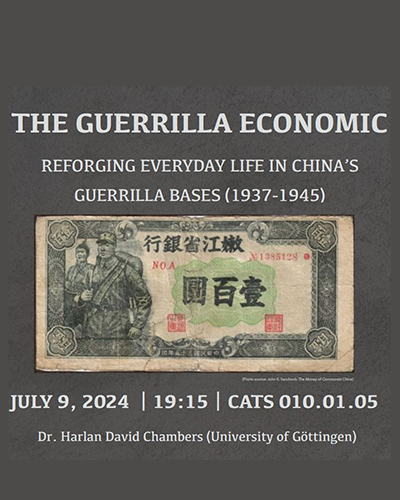Dienstag
09
JUL
| 19.15 Uhr | The Guerrilla Economic: Reforging Everyday Life in China’s Guerrilla Bases (1937-1945) Dr. Harlan David Chambers (University of Göttingen)
 How did the guerrilla emerge as a figure for economic thinking in China’s revolutionary history? Throughout the 1930s, the guerrilla was mediatized across Republican China as a global figure of resistance struggle. At the same time, China’s own Communist movement was developing guerrilla tactics, which Mao Zedong famously formulated in wartime speeches on guerrilla strategy. I will argue that, during China’s WWII “war to resist Japan” (1937-1945), the guerrilla was reconfigured as a Communist strategy to make global resistance local, specifically through relations of the guerrilla to its projects for economic reconstruction. This integration of the guerrilla and the economic emerged in party reports and cultural works developed in guerrilla zones behind enemy lines, where fighters’ “mobile attack” (游擊) approach was conceptualized in relation to projects to develop economic systems for the base areas (根據地). With a particular focus on documents from the first major Jin-Cha-Ji base area in the late 1930s, I will argue that these experiments forged a “guerrilla economic:” an experiment to rethink economics as a social practice intimately linked to everyday life under wartime crisis. This stimulated a reimagining of the economic as unleashed from institutionalized expertise and rooted instead in active, broad-based participation.
The first part of this talk examines the emergence of the guerrilla across the 1930s and 1940s as a key figure in the political imagination of Chinese thinkers and revolutionaries. From Ethiopia to the Soviet Union, the guerrilla was conceived as an anti-colonial and anti-fascist combatant relevant for the strategies of China’s Communist own “mobile attack” units. The second part then analyzes how the guerrilla was conceptualized, in theory and practice, in relation to economic development projects of the Jin-Cha-Ji base region. To further elaborate on this guerrilla economic as it developed in the political imagination, I will finally turn to cultural experiments of writers who used creative fiction to think along with the guerrillas in their midst.
About the speaker
Harlan Chambers completed his Ph.D. in Modern Chinese Literature and Culture at Columbia University in 2022 and served as a Visiting Assistant Professor of History at Illinois Wesleyan University before joining the Department of East Asian Studies at the University of Göttingen in 2024. As an interdisciplinary scholar of Chinese culture and history, as well as feminist and critical theory, his research interrogates the role of cultural practices in processes of social transformation, integrating archival research with analyses of cultural texts. He is currently developing his dissertation into a book-length project, Revolutionary Times: Narrating the Social in China’s Mass Campaigns, examining how writers and artists forged a new politics of time amidst the revolution’s history of mass campaigns.
As part of a research team exploring the history of conceptions of world order at the University of Göttingen, Harlan will interrogate internationalist cultural experiments in world-making.These include aesthetic and theoretical projects related to the League of Leftwing Writers, Sino-African relations, and cultural efforts to reimagine China’s place in the world amidst crises of the 1930. Harlan is also examining internationalist aesthetic debates of the early People’s Republic of China, particularly their relation to questions of socialist transition. This builds upon a series of workshops that he previously co-organized and hopes to continue developing at Göttingen, “Chinese Socialism in/as Theory: Political Economy in Revolutionary China.” In addition to peer-reviewed scholarship in Modern Chinese Literature and Culture, he has translated or co-translated works by Wang Hui, Li Tuo, Zhang Jishun, and the contemporary artist Cao Fei, for positions: Asia Critique, Modern China, and The South Atlantic Quarterly. Adresse Institut für Sinologie 010.01.05 Voßstraße 2 69115 Heidelberg Veranstalter Institut für Sinologie Homepage Veranstalter www.zo.uni-heidelberg.de/sinologie Kontakt Institut für Sinologie |
